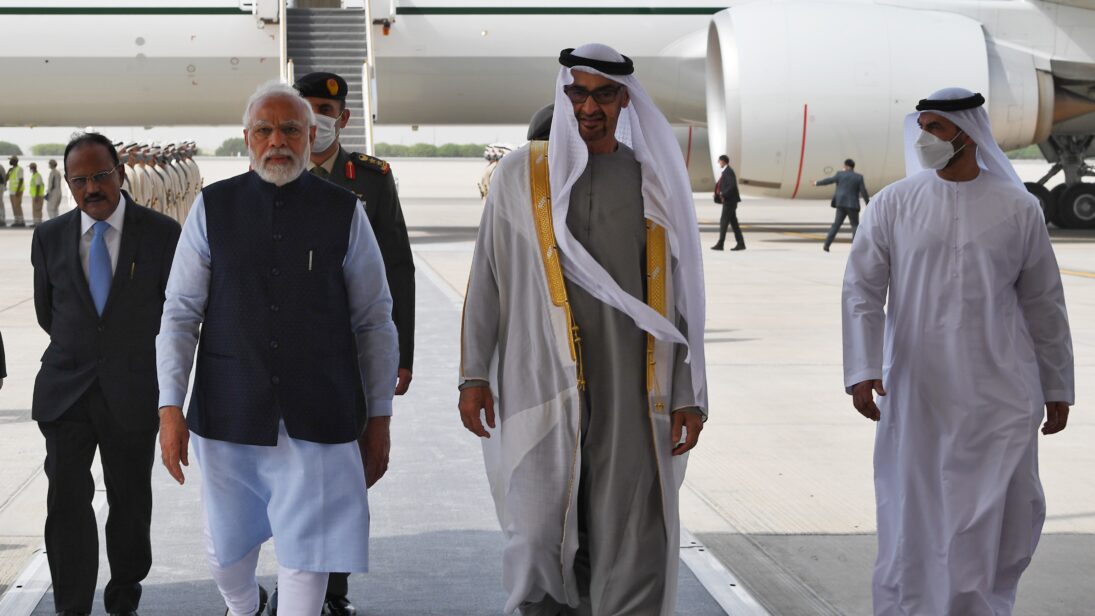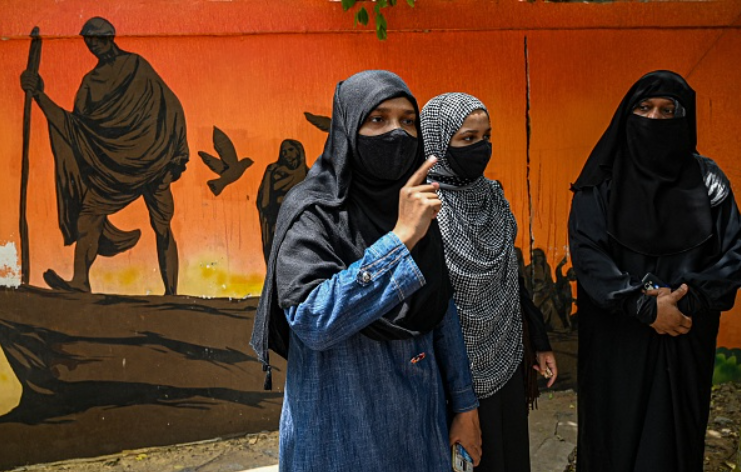
Last month, India faced a diplomatic quagmire when Nupur Sharma and Naveen Jindal, spokespersons of the ruling Bharatiya Janata Party (BJP), made incendiary remarks on Prophet Muhammad in a TV debate and a social media post. The comments sparked international outrage from Islamic nations, including countries in the Gulf Cooperation Council (GCC). The extent of public anger and diplomatic condemnation from Islamic nations came as a complete surprise—if not shock—to the Indian government. It was the first time in recent years that India faced such large-scale statements of condemnation and reactions, including the summoning of Indian diplomats, from the Muslim countries. Buckling under external pressure, the BJP suspended Sharma’s membership, expelled Jindal, and denounced both their comments.
The Indian government’s swift response was logical, as it did not want to strain its relationships with the Gulf countries that have deepened in recent years, especially under Prime Minister Modi’s leadership. Beyond expressing mutual interest in cooperating on energy, trade, and infrastructure, the Gulf countries have refrained from condemning India’s policies that have been attributed to perpetuating increasing violence against religious minorities, including the revocation of Article 370 and the Citizenship Amendment Act.
However, the government’s quick reaction aimed to maintain its ties with the Gulf states, received criticism from BJP supporters in its domestic audience. Many on social media extended their support for Nupur Sharma and criticized the government for its actions against the party officials. The contradictory domestic and international public reactions reveal a considerable challenge that India currently faces in maintaining effective public diplomacy that goes beyond this one incident alone: India’s current majoritarianism can potentially trigger similar incidents, which, in turn, can foster negative public perceptions of India abroad and negatively impact its broader bilateral relations.
The Politics of Public Diplomacy
The intense international outrage in Nupur Sharma’s case illustrates how domestic politics increasingly prompts a public diplomacy crisis for India. Under the current government, politically mobilized citizens have become central to the country’s public diplomacy. Public opinion on India’s foreign policy has never been as emphatically expressed as it is now due to the Hindu-nationalist politics of the BJP. The Hindu nationalism’s narrative of religious and civilizational supremacy over others has propelled public and political interest in the country’s foreign affairs. Despite being an instinctive reaction in a heated national television debate, Sharma’s comments reflected the dominant political sentiment resting on the religious-cultural construct of Hindu supremacy and its increasing decadence into deepening religious intolerance in recent years. Consequently, the Sharma incident underscores that India’s current politics—brazenly majoritarian, deeply polarizing, and bluntly assertive—is growing incompatible with its public diplomacy based on democratic, secular, and multicultural values.
Consequently, the Sharma incident underscores that India’s current politics—brazenly majoritarian, deeply polarizing, and bluntly assertive—is growing incompatible with its public diplomacy based on democratic, secular, and multicultural values.
The international fallout from Nupur Sharma’s remarks indicates two consequences of the rising Hindu nationalism for India’s public diplomacy. First, the domestic allure of Hindutva in India’s politics is internationally unappealing and will have negative consequences for India’s relationships abroad. Second, the general public in India cannot detach foreign affairs from the narrow prism of religious nationalism. This growing lack of civic sensibility stems from the BJP’s conflation of Hindu religious identity with Indian national identity, which makes it difficult for the Indian government to balance national interests and domestic public concerns, often costing India’s reputation abroad.
Impact on India-GCC Relations
Even as the leaders of the angered countries seem to have welcomed India’s swift response, the country’s reputation has already suffered damage from the widespread public support for Nupur Sharma on social media, especially Twitter. The cynical public response has overshadowed India’s official response, reinforcing the existing international discourse around the country’s growing intolerance of minorities.

While one incident might not negatively impact the state-to-state relations between India and the Gulf countries in the short term, similar incidents can foster negative public perceptions of India in the Gulf that can impact the overall bilateral relations. Although national interests at the leadership level drive bilateral relations, religious and identity-driven emotions play significant roles in building people-to-people ties. For instance, overwhelming negative public opinion of Israel in the Arab countries is often identified as a driving factor in preventing the normalization of Arab-Israel relations. Religious sensitivities can especially affect public opinion and compel the leaders to downgrade relations.
Citizens can also act on their own—without government intervention or sponsorship—to influence bilateral ties. For example, there were public calls in Gulf nations to boycott Indian products in response to Sharma’s remarks. Moreover, Islamophobic comments by some Indian diasporas in the Gulf had earlier drawn criticism and warnings from Arab netizens, scholars, and royals. The biggest likely fallout of similar incidents could be religious prejudice against the Indian migrants in the GCC countries, which constitutes some of the largest populations within the growing Indian diaspora. To prevent further damage to public perceptions of India abroad and people-to-people connections, which remains the solid foundation of India-GCC ties, the BJP will need to ensure similar incidents do not occur again. However, given the fact that majoritarian rhetoric is an effective political mobilizer in domestic politics, preventing such incidents is a challenging task as it requires the ruling party to make political compromises.
The biggest likely fallout of similar incidents could be religious prejudice against the Indian migrants in the GCC countries, which constitutes some of the largest populations within the growing Indian diaspora.
The international fallout from Nupur Sharma’s comments should teach India that its domestic politics has overwhelming public diplomacy implications. Growing extreme voices within the country could obstruct fostering a desired perception of India among foreign audiences. In terms of a practical response, the BJP can start viewing official spokespersons of the party, while in power, as public diplomats. The ruling party should appoint official spokespersons who can maintain composure while engaging in dialogue and debate on digital and social media about critical political questions involving religious sensitivities.
There is little doubt that Nupur Sharma’s remarks cast a blot on India’s image abroad, and public support for her remarks has only hardened it. The Indian government should focus on how domestic politics poses a challenge for its public diplomacy and be mindful of the consequences of taking historical people-to-people ties for granted.
***
Image 1: MEA India via Flickr
Image 2: PRAKASH SINGH/AFP via Getty Images


